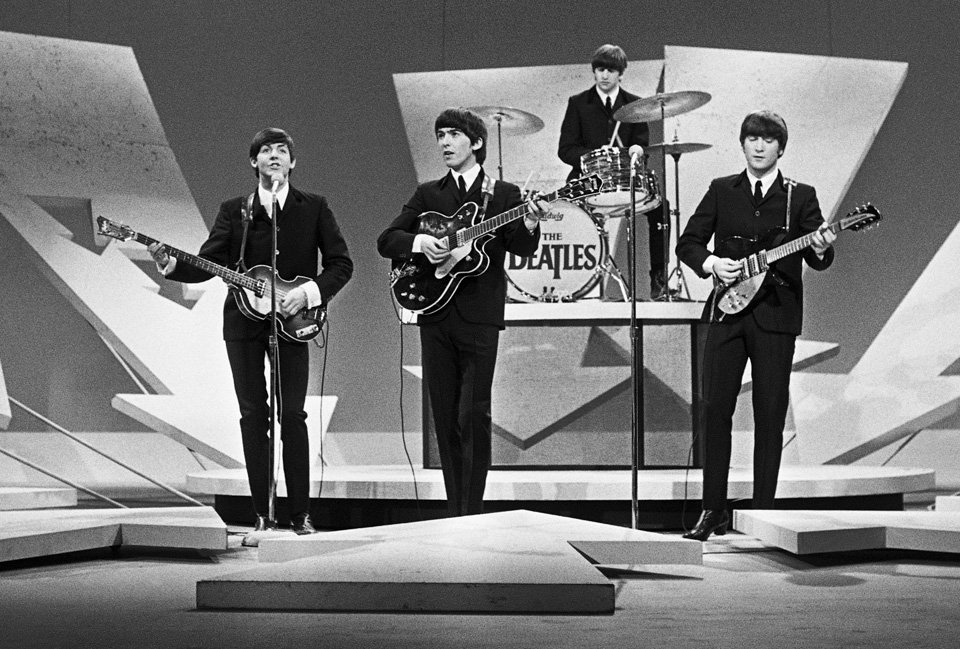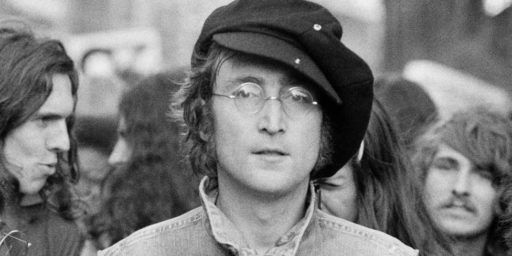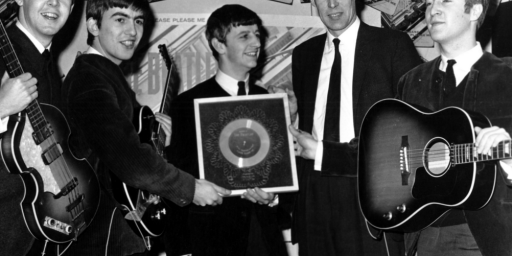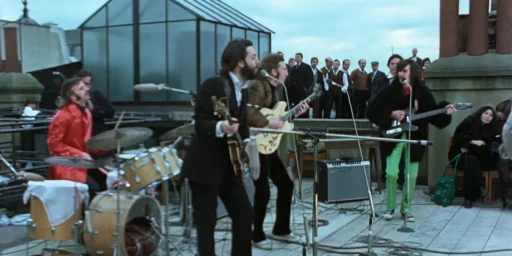New Beatles Material Being Released Solely To Extend Rights Under Copyright Laws
An example of how copyright laws have been perverted to protect corporate interests rather than encourage artistic creativity.
Related to Matt Bernius’s post about U.S. Copyright laws and the fact that so little material will be entering the the public domain in the coming years, we learn today that tomorrow a slew of previously unreleased material by The Beatles will be released on iTunes not so much as a favor to the fans, but to due to the oddities of European Copyright Laws:
Apple, the company set up by John, Paul, George and Ringo, is set to release a new 59-track album next week, just in time for the festive season – and it’s all thanks to EU copyright laws.
Although it will not include some of the more fabled Beatles recordings – such as Carnival Of Light, or a 28-minute version of Helter Skelter – Beatles enthusiasts will no doubt be excited by the prospect of alternate versions of early classic such as A Taste Of Honey and She Loves You.
The release has been prompted by copyright laws, which mean that unreleased music loses its copyright – and can therefore be taken for free and even sold by others – after 50 years.
The album, to be released next Tuesday by Universal Music, will include performances recorded for the BBC and studio outtakes.
The Beatles Bootleg Recordings 1963 will also include demonstration recordings of two songs that the band eventually gave to other artists.
This will see Lennon and McCartney’s Bad To Me, which became a number one hit for The Dakotas, and Lennon’s piano demo of I’m In Love, released by the same band, available on iTunes.
BBC sessions of familiar songs such as From Me To You and I Saw Her Standing There, all made half a century ago, are included on the track list, which has appeared on Norwegian-based Beatles blog, WogBlog.
The website, which reported the release, suggested that the collection is an effort to give the material copyright protection and stop it falling into the public domain.
TIm Worstall at Forbes explains the copyright angle for all of this:
The background is as follows. There’s two different (actually more than that but these two are important) copyrights on a piece of music. One is the songwriter’s copyright and that lasts until 70 years after the author’s death. So John Lennon’s songs are copyright until 2050 and Paul McCartney’s until 70 years after his hopefully long delayed death. There will be a strange period when their songs for the Beatles, which were registered as Lennon/McCartney, will be half in and half out of copyright. There will still be payments made to Paul McCartney’s estate but not to Lennon’s. Just a little oddity there.
The other copyright is on sound recordings. This is the specific version of that song that was recorded by certain musicians at a certain time and place. Sound recording copyright has, historically, only lasted for 50 years. So those recordings from 1963 are just about to go out of copyright. Except, the European Union has just changed the law. As a result of a campaign fronted by Cliff Richard the sound recording copyright was extended to 70 years. But the recordings must have been released for that 20 year extension to apply. And thus we’re getting this new album of live in the radio studio and TV show stuff from the Beatles. A release purely on Apple’s iTunes does indeed count as a release and so that’s why they’re doing it. If they didn’t release these songs then anyone who already had a bootleg version (and there’s tens of thousands of copies around) could release it themselves, even charge for it.
On one level, I suppose that Beatles fans can thank the copyright laws for giving Apple (the record company) the incentive to release things that had been sitting in their vaults for decades and otherwise might never have been or released, or perhaps released years from now. Before this decision, they were in roughly the same position as fans of other recording artists ranging from The Doors to Frank Sinatra who have had to sit on the sidelines for years waiting for American record companies to, slowly but surely, release vaulted material ranging from alternate studio takes of classic songs to live recordings of concerts that have never seen the light of day before. In the case of some artists, of course, such as The Grateful Dead to Sinatra, many of those live recordings have been spread and shared underground via bootleg recordings, many of which have been of far poorer quality than the recordings that record companies are sitting on for one reason or another.
Notwithstanding the benefit to fans of being able to access previously inaccessible recordings, though, this strikes me as a fairly good example of what Matt is talking about in his post. Merely by releasing these recordings on iTunes, the holder of the copyright on sound recordings is suddenly able to extend their copyright over those recordings for at least another twenty-five years. The analogies to the various methods by which Disney and other media companies have utilized American copyright laws to keep even their oldest material out of the public domain for the foreseeable future are, of course, rather obvious. Nobody wants to deny artists and copyright holders the rights that they are entitled to by law, but as examples like this and those that Matt cites show, these entities have such deep pockets that they are able to influence legislatures around the world to keep extending the protections seemingly in perpetuity. That’s not what copyright laws were originally not intended for, at least not here in the United States, and they strike me as an excellent example of what has variously been called either “crony capitalism” or “corportism,” and it’s had a pernicious impact on our political system and our culture.







What a bunch of squares.
Also, that hair. Oh man, that hair.
Fascinating article… if torrenting didn’t make it moot for many.
This is not an admission of, or an approval of, illegal files sharing… just saying that it happens.
Like I said on a different topic… I no longer inhale.
It’s either Yoko’s fault…or Obama’s.
Hold on, sir. Are you seriously suggesting that highly educated business people, well versed in the law (or able to hire people who are) are gaming the system for profit?!
Why, next you might propose that these people are not actually adding value, but are simply rent-seeking profiteers shuffling paperwork and reaping immense rewards.
Wait until Hollywood the pharmaceutical industry investment bankers media properties Tom Friedman hears about this! Must be a day ending in ‘y’.On the flipside, just to play devil’s advocate, why should there ever be an arbitrarily determined point at which you lose exclusive rights to and control over your work product?
@HarvardLaw92:
What is arbitrary about “because you died”? That seems like a reasonable one to me.
I understand why patents are transferable, but for copyright it makes no sense at all. Dead artists don’t need protections; people who weren’t the artist don’t deserve them.
@DrDaveT:
Under that argument, why should ownership of my physical property survive me, in that I get to dictate how it is disposed of?
I see ti as being no different than a house or a piece of land – once I die, it survives in perpetuity and the ownership of it passes to whomever I decide should receive it. At that point, it is their property, and remains their property until they decide to dispose of it.
In case it slipped anybody’s notice, I am a Nazi about property rights.
@HarvardLaw92:
Nope, sorry, I saw where you palmed the card. We’re not talking about physical property, and conceding that copyright is the same sort of asset would beg the question.
(Of course, I’m not one of those people who is offended by the idea of inheritance taxes, either. Most wealth is inherited, and I don’t see the case for why the drone class needs to be protected.)
The purpose of copyright is to protect creators. Not (necessarily) their heirs, and certainly not the scavengers of art. I’m willing to hear arguments for why the heirs should get something, but I’m not willing to concede it as a given.
@DrDaveT:
Hence the disconnect. I see no difference. Property is property. Ownership of it is sacrosanct, without exception. I brook no argument, ever, about why property should be seized without recompense in the interest of the greater good.
If I want to help the greater good, and I usually do, then I will do so, but don’t ever tell me that I have to. That one I’ll fight in court.
@HarvardLaw92: ” I brook no argument, ever, about why property should be seized without recompense in the interest of the greater good.”
One might argue that the seventy plus years of protection by the government is actually the recompense. That we as a people will expend our resources for a certain amount of time to protect your rights in an idea, and in exchange for that protection after the period has expired you will cede — by choice or no — to the fact that you no longer hold these rights.
That is certainly the view of the authors of the constitution, and you never have explained why you feel they are wrong, aside from insisting that what’s yours is yours and no one is the boss of you.
A strident declaration of preference is all well and good, but I do still wonder why you believe that you know more on the issue than the people who founded our country.
@wr:
As I noted earlier, those same folks believed it justifiable and right to consider Negroes to be 3/5ths of a person,and considered it so strongly right that they enshrined it into the Constitution that they wrote.
Do you believe that you know more on this issue than they did? Lose the snark.
@HarvardLaw92: And again, you are using something that h has been amended out of existence to justify your contempt for the constitution. I am honestly curious, since you portray yourself as a devotee of the law, do you really believe that this terrible mistake written into our founding document as the price for union, removed through the sacrifice of millions of lives, and not a part of the constitution in a century and a half, invalidates everything else in there that you choose not to like?
I’d love to read a real justification of why you feel your personal belief is right and the founding fathers wrong — one that would include the actual constitutional argments. But saying “there was slavery, neener neener” does no just to your ideas, your thought process, or your image.
@wr:
I stopped really taking you seriously when the ad hominems starting popping up.
If the compromise provision was wrong and needed to be amended, why is copyright law somehow incontrovertibly right? Because you say that it is? Fine, I say different, and I noted earlier, if you choose to cede your property rights, then knock yourself out. I won’t cede mine so cheerfully. We both win.
In my opinion, they got it wrong on intellectual property rights. Had I the means, I’d get it amended to correct what is, in my opinion, their mistake. In the meantime, I am tasked with simply going to court to defend my interests, within the context of my beliefs, as may be necessary. If I can’t change what they wrote, which I believe to be wrong, then my next course of attack is to attempt to convince a court that they were wrong. Same outcome, different means.
The broader point? Don’t deputize the founders into your emotional argument unless you are prepared to justify and defend EVERYthing that they put into the Constitution. Neither they, nor the document that they prepared, was or is perfect.
@HarvardLaw92: Once again, you are either unwilling or unable to tackle the moral and intellectual arguments behind the founder’s decision on copyright, and revert to “it’s mine.”
I’d still like to know why you believe the founders’ reasoning is wrong.
@wr:
We are both advancing a moral position. You think that it is justifiable to, at some point in time, seize property in the interest of some sense of societal benefit. Fine, you’re entitled to believe that.
I believe that my interest in maintaining my property rights outweighs whatever (in my opinion) invented rationale you have conjured up. We are both free to act in furtherance of those beliefs, with the caveat that you have no input into my situation and I likewise have no input into yours. I’m not interested in arguments about some sort of greater good and how noble the cause may be when it comes to my stuff be expropriated to support it.
Your argument seems to me to be much more a case of “you are wrong because I find your stance to be objectionable”. That’s your right, but I’m not going to dignify it or feel obligated to defend my own interest in protecting my property rights simply because you have decided that I’m stingy. I’m not interested.
The founders may agree with you on this issue, but as we have seen, they are not infallible, so deputizing them into your argument is a flawed approach.
You believe, based on your subjective judgment, that you are right. I do the same, and as it applies to my property, I will vigorously defend that belief. You can certainly choose to oppose it and/or to cede your own rights with respect to your stuff. That’s the beauty of freedom.
@HarvardLaw92:
As I wrote in the other thread, the artist types who actually own IP of that sort, would not equate it with other property rights.
First of all, anyone who says they wrote a book that was entirely original and not derivative of other people’s books is a fool or a liar. No Stephen King = No me. No Edgar Allen Poe = no Stephen King. We all rip each other off. Pretty sure I didn’t invent every element of my prose style, and also pretty sure many of the scenes I’ve written are substantially similar to someone else’s work.
No, we need the big pool of books in order to create more books. No writer will tell you any different. Artists of any type will tell you that. My book, dance, play, song, whatever, is intimately connected to those who preceded me. I’m riffing on their work, just as other people are riffing on mine. This is not the relationship I have with my car or house. It’s a different category of ownership.
@michael reynolds:
And that’s fine. You are entitled to view your work product as you see fit. Being neither a copyright nor a patent holder, I’ll respect the viewpoint. That said, were I ever to be either of those, I would have to respectfully disagree with the viewpoint within the context of my own IP. The beauty of a free system is that all of us get to, or at least should get to, determine for ourselves how our property is utilized.
@HarvardLaw92:
Let me go to a legal anaology. My IP lawyer (plug: Steve Sheppard, CDAS) is sometimes sinfully proud of some bit of legal language or contract he manages to wedge into a contract. The opposing lawyer (let’s say HarperCollins or Sony) is free to use that language or concept in the next contract they prepare. And thus The Law advances, one lawyer feeding ideas and language to another.
Shepp gets paid by me, but he doesn’t try to keep the next lawyer from picking up on his contractual cleverness. If everything Shepp (and all lawyers by extension) did was copyrighted, am I wrong in believing that contract law would be the poorer for it? And at the same time, isn’t it likely Shepp drew inspiration from contract language prepared by those who preceded him?
In the U.S., I think pre-1972 sound recordings are exempt from federal preemption that was enacted in the 1978 Copyright Act and state law protection for those recordings, which had been under “common law copyright,” remains in effect and is perpetual (although I guess there’s a possibility of state-by-state variation). At least, that’s what someone told me.
@michael reynolds:
Copyright law as it stands wouldn’t encompass the verbiage to begin with. I suppose that , were he so inclined, he could attempt to copyright the expression of the idea itself, but I tend to think a property interest is created in something more substantial.
Ergo, hypothetically COULD I copyright a section of legalese? Possibly, but the property interest thus created is so negligible in value as to not merit defense.
@michael reynolds: Gawd, don’t give us ideas. Lots of law departments and firms think their contract forms are confidential (trade secrets, maybe?) already, which I think is pretty weak considering they send them out all over the place all the time. I think I heard once about a lawyer claiming copyright in a brief he had filed, to keep it from being picked up and republished (and possibly mocked for some argument it was making). I have no idea where that went …
FWIW, short phrases aren’t protectible by copyright, or at least so says the Copyright Office reg on the subject. Titles too.
@michael reynolds: Well, it seems that those who actually hold copyrights in IP pretty much feel the same way, while HL92, who has created no copyrighted material nor apparently has any intention of doing so in the foreseeable future — judging by his statements — is willing to fight to the death to protect something he knows will never exist.
And thus goes the thinking of the libertarian… theoretical freedom is the only one that matters.
@michael reynolds:
Thank you. Spot on analogy.
@wr:
Yet again, lose the “HL92 sucks” snark. You’ve worn that point out.
Consider it a reflection of my larger worldview – namely that tend to viscerally reject any assertion that other people are better situated to make decisions about my life, my property and my exercise of my rights than I am.
It has gotten to where anytime I see the phrases “greater good”or “societal benefit”, I know I am about to be subjected to some permutation of how the world would be a better place if I had less and others had more, advanced by people who, as I said above, seem convinced that they are better qualified to determine how to utilize my assets than I am. I find that line of thinking both offensive and incredibly, overbearingly hubristic.
If you want to make the world a better place, use your checkbook to do it, but leave mine alone.
@HarvardLaw92:
Oh please. Property is a convention, and always has been*. Or does your “property is property” extend to wives and slaves too? You seemed to think that the whole slave thing was a bad idea up above; how do you reconcile that with “property is property; ownership of it is sacrosanct”?
*For values of ‘always’ that only go back to the invention of property, which post-dates human society by a fair piece.
@DrDaveT:
Nonetheless, the 5th Amendment protects us against arbitrary takings, and the courts have been more than clear that the takings clause is applicable to intangible property. Moreover, Congress itself has stipulated, by statute, that intangible property like a patent is personal property, subject to the same property rights as any other form of personal property.
The fact that YOU don’t think a property right exists here doesn’t change the fact that, legally, one exists and is defensible.
@HarvardLaw92:
Well, until you stop sucking, I don’t even think he’s made the point, let alone worn it out.
(Why, why, do you set that up? Is that really what you want this blog’s comments to be, ad nominee personal attacks? And yet, how can anyone resist?)
@Gustopher:
I’d suggest checking out the other thread on this subject. He has, indeed, worn that ad hominem out. And then some …
Oh, and let me know when you get around to making an argument.
@HarvardLaw92: “Consider it a reflection of my larger worldview – namely that tend to viscerally reject any assertion that other people are better situated to make decisions about my life, my property and my exercise of my rights than I am.”
I will consider that a reflection of your worldview, although I find it hard to describe it as a “larger” one. Bog standard libertarianism, basically the adolescent’s scream of “I got mine all by myself and I’m never going to share never never never” is something I find even more tedious and less open to examination than the finer points of Scientological debate, and thus I will leave you to your happily self-satisfied world, where you may slay dragons to protect the copyrights of works you will never write…
@HarvardLaw92:
…and thus you retreat from an assertion about the sanctity of property to a much weaker one about what current US law holds. Which was not the point in question.
Yes, I know that current US law feels that a copyright is just as heritable and transferable as the family bible. But then, current US law also apparently feels that corporations can have religious beliefs. Not a particularly reliable authority.
And, of course, under current US law property rights are not all equal, and not absolute. There are many circumstances under which society can legally take your property from you — some are rare, others quotidian. If you feel that those laws are unconscionable violations of the sanctity of property, don’t use current US law as backing for your position. If you don’t feel that they are unconscionable, don’t pretend that you think property is sacrosanct.
@wr:
And yet here you are, still tilting away at the windmill of me. I suppose I should be flattered.
@DrDaveT:
Of course there are, namely the 5th Amendment. I have no problem with the overall concept of you terminating a copyright or otherwise seizing intangible property.
You just have to pay up in order to do it. It’s that simple. You don’t get something for nothing, no matter how much you can convince yourself that “society” will benefit.
@HarvardLaw92: 5th amendment? Did they change something while I wasn’t looking?
@michael reynolds:
I can’t put my fingers on the article now, but was reading about creativity a bit ago and the idea put forward was that creativity isn’t generally creating something new, but putting old things together in new ways. Essentially everything is derivative and the really creative among us manage to put those derivative bits together in more novel ways. The article explained and supported it much better than my tired brain is capable of now.
@HarvardLaw92:
That same document that you rely on to justify the right you think should be sacrosanct and last in perpetuity explicitly limits that particular right. That puts your argument in a rather untenable position. If you are to remain consistent, you need to go outside the Constitution and its amendments to justify your claim on takings.
@Matt:
No. Read the takings clause in the context of Huntleigh USA Corp. v. United States and 35 USC 261.
@Grewgills:
Explicitly limits it in what way, Greg? The takings clause references private property. It does not specify only tangible property. The courts have been clear that the clause applies to intangible property as well.
@HarvardLaw92:
Wasn’t it established earlier in the other thread that the constitution specifically limited copyright?
You specifically said you found the Constitution flawed in its view of copyright. Once you have established that you find the document flawed in its address of one right, it is not very convincing to go to another part of that same document to defend another right. You are cherry picking.
@Grewgills:
The point is that the copyright clause is contained in the original body of the Constitution. The 5th Amendment postdates that, ergo on matters that conflict, the amendment is governing law.
Short version: the copyright clause permits the abrogation of a property right, while the 5th Amendment overrides that to stipulate that a property right may not be taken by government without benefit of due process and just compensation.
Amendments overrule original text in areas where both address the same concept.
@Liberal Capitalist: youtube downloaders are really nice too!
@michael reynolds: I recently encountered the book Steal Like An Artist. I think it ought to be required reading for HarvardLaw92, and would certainly be enjoyable reading for anyone else who creates intellectual property. As a side note, it is the ONLY book I’ve ever read about creativity that “gets” it.
@Grewgills: I can’t remember where I ran across the book I referenced below (Steal Like An Artist). I thought it might have been brainpickings.org but I’m not finding it there. However, I did run across this, which sounds similar to what you’re talking about: http://www.brainpickings.org/index.php/2011/08/01/networked-knowledge-combinatorial-creativity/
@HarvardLaw92: Then please have a brain-wipe, head out into the wilderness, and start over from scratch. Including creating your own language.
Otherwise you have definitely benefited off other people’s ideas and concepts and artistry. Contributing back to the pool of common knowledge without demanding recompense is your payment for having had been able to be educated in it in the first place.
Oh, and I suppose you feel that you are a completely “self-made individual”, right? I bet the person who diapered your wee little bottom and gave you a bottle when you cried has a different opinion….
The Constiution does create property rights in ideas but only for a particular purpose:
Seemd to me that extending that right beyond that purpose-to the point where it actually retards the “Progress of Science and useful Arts” is not only wrong, but even unconstiutional.
I am not persauded-and nobody I know is-by the argument that the Fifth Amendment removed all limits on the life and extent of IP rights.
@stonetools: Nor am I. Ignoring the caselaw (!) there is the fact that the Fifth Amendment was enacted at the same time as the Constitutional grant of authority to congress to adopt laws providing for the advancement of the arts and sciences exclusivity for a limited time etc.
OTOH the Court is chomping at the bit to return to a states rights Lochner era where 5th amendment concerns trumps most fed actions.
The notion of property is very squishy and has evolved over time. For me, the notion of “intellectual property” is a first rate con to justify rents. I wholly believe and support the idea of the government protection of copyright for a limited time in order to stabilize a market for the “useful arts and sciences”. in the same way the government does so for a wide range of activity from agriculture to medicine to real property. But I also think that all too often there is massive confusion between the right to one’s property and the governments interest in protecting it. I have a right to my property sure but should the government have an interest in protecting it? The government does not protect a lot of things like clothing design, ideas, or clever sayings. What has been going on in patents and copyrights are an expansion far beyond the practical state interest in protecting a market so that software, novels, recordings, and so on will continue to be produced and frankly current law has left the protecting the market station a long time ago and has entered the rent collecting toll booth.
There is also a huge difference between say my car, which if stolen deprives me of the use of the thing I bought and “stealing” a recording I made which robs me of nothing except for a theoretical profit but only if the “theft” results in my no collecting the $.99 that I might otherwise have made. I maintain that no movie, or recording I have ever downloaded illegally deprived the author of one red cent since I would have never purchased the work otherwise.
Do you have an absolute right to “own” your IP? Sure. Should the government be compelled to enforce that right on your behalf against any and all claims? No, of course not, the only argument is what interest does the state have in protecting you “IP” where should that interest start and where should it end and I say with now it way too far in the wrong direction and hurts the economy overall.